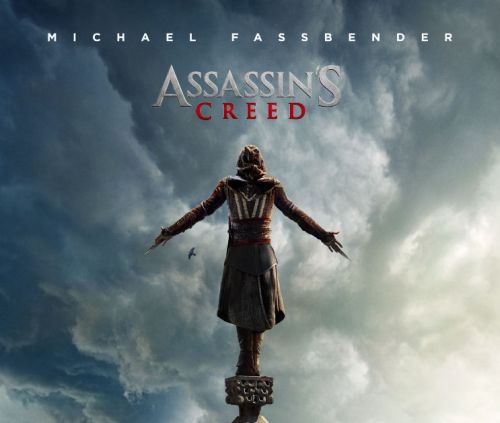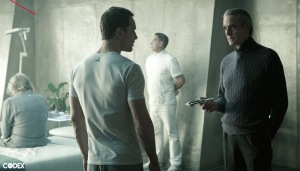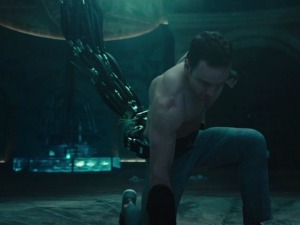Star Rating: 2.5/5
Director:
- Justin Kurzel – The Snowtown Murders, Macbeth, Haven
Cast:
- Michael Fassbender – Hunger, X-Men: First Class, Shame, Prometheus, 12 Years A Slave, X-Men: Days of Future Past, Macbeth, Steve Jobs, X-Men: Apocalypse, The Light Between Oceans, The Snowman
- Marion Cotillard – Public Enemies, Inception,Midnight In Paris, Contagion, The Dark Knight Rises, Rust And Bone, Macbeth, Ismael’s Ghosts
- Jeremy Irons – Reversal of Fortune,The Lion King, Eragon, The Borgias, Batman v Superman, Monumental
- Brendan Gleeson – Gangs of New York, Troy, Harry Potter V-VII(i), Suffragette, Hampstead
- Essie Davis – The Matrix II-III, Australia, The Babadook, Game of Thrones, Andorra
- Charlotte Rampling – Spy Game, Basic Instinct II, The Duchess, I,Anna, Valley of the Gods
- Ariane Labed – Magic Men, Love Island, The Lobster, Séances
Music Composer:
- Jed Kurzel – The Snowtown Murders, The Babadook, Slow West, Alien: Covenant
Films based on video games have not been well received, historically. Super Mario Bros, House of the Dead and BloodRayne were atrocious; Street Fighter was rubbish, even if it had moments of unintentional hilarity; while Warcraft was bad, but tolerable mainly due to the visuals. This raises two questions: one, can video games be successfully adapted into movies? And, two, could Justin Kurzel, reuniting with his Macbeth co-stars Michael Fassbender and Marion Cotillard, buck the trend of bad video game adaptations with Assassin’s Creed?
Assassin’s Creed is based on the video game franchise of the same name. The film goes back and forth between fifteenth-century Spain and the present day. Cal (Michael Fassbender) is a descendent of Aguilar de Nerha, an assassin in 1492. He is recruited by a scientist, called Sofia (Marion Cotillard), who needs him to go into a machine and become his ancestor. That way, they can discover what happened to the Apple of Eden. For the Apple was the source of sin in the world and, with it, Sofia and her father, Rikkin (Jeremy Irons), can rid the world of evil. The only problem is that the Knight’s Templars stand in their way…
Assassin’s Creed has a lot going for it. The CGI is very good. Justin Kurzel has done his homework with regards to what Spanish cities looked like in 1492, so the art and architecture are fantastic. Michael Fassbender puts in an admirable, physically-demanding performance that Jason Bourne would be proud of. And the film is full of fight scenes and action sequences that are well choreographed.
Yet, for all the above, Assassin’s Creed is boring and head-bangingly silly. The storyline makes no sense (not that it was ever meant to) and the movie has a superfluous amount of overly long (and amateurishly sped up) fight scenes. Indeed, the film has so much action, one wonders if the fleeting bits of (incoherent) dialogue are sprinkled in here and there to give viewers respite before the next action sequence begins.
Furthermore, the performances of Marion Cotillard and Jeremy Irons leave a lot to be desired and both deserve their Golden Raspberry nominations. Cotillard, at least, looks like she is trying (at times), only to be let down by the nonsensical script. Irons, on the other hand, is just going through the motions. His laziness is on a par with Liam Neeson in Battleship, which means Irons is in Assassin’s Creed solely to pick up the cheque and visit some historic locations while he’s at it. (Come on, Irons, you can do better than this. You have won an Oscar, voiced Scar with banal menace, and earned yourself a golden globe nomination for your portrayal of Pope Alexander VI as recently as 2012. Put in some effort for heaven’s sake.)
Nevertheless, as bad as Irons’ acting is, Jed Kurzel’s music is worse. God knows why, but he decided against using Assassin’s Creed’s awesome video game theme tune for the film. (Seriously, it is so awesome DB Weisz and David Benioff used it as background music for the second trailer for Game of Thrones, Season Five.) No, instead, Jed Kurzel has written an awful score that is so loud it cannot be heard and gives one a thumping headache. Plus, what was Jed Kurzel thinking when he decided to use loud, electric guitars to be at the heart of his score for the Medieval/Renaissance Spain scenes? It simply does not work!
Over-all, Assassin’s Creed is a shambles of a film, but it is not an atrocity to cinema. Sure, it is dull; the script and the dialogue are incomprehensible; some of the acting reeks of a disinterest; and the music is horrible. But the movie also has several positive elements, such as the CGI, cinematography and Michael Fassbender’s acting. These give the film cre(e)dence and make it marginally watchable.
But does Assassin’s Creed buck the trend of bad video game adaptations? Not really. And if a video game adaptation with as much talent as Assassin’s Creed cannot turn the tide in the right direction, perhaps video games should remain on their consoles rather than be adapted for the big screen.
PG’s Tips








